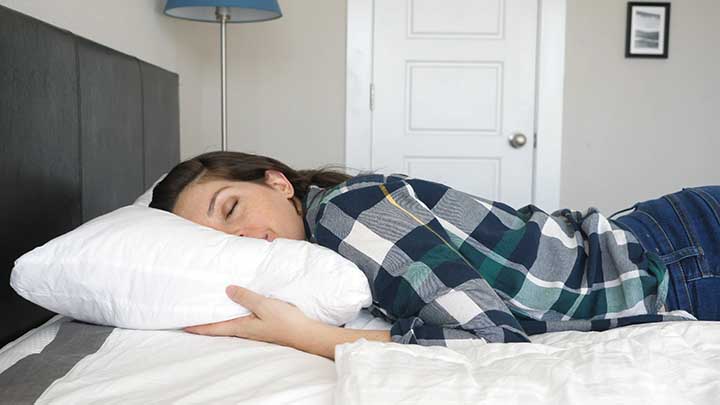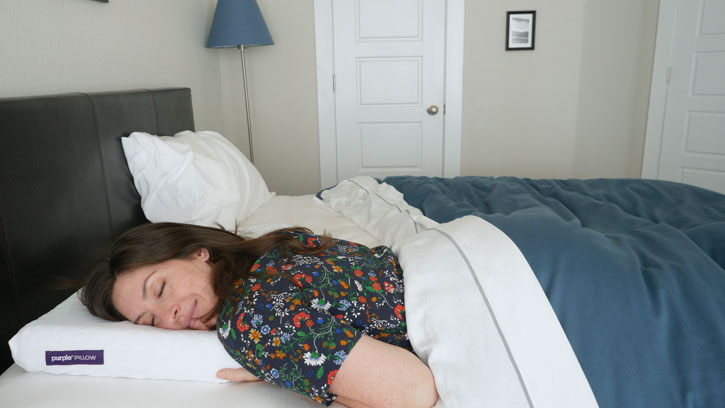Only 16% of adults sleep on their stomachs, making it the least common sleeping position. Stomach sleepers may feel comfortable when drifting off at night, but most doctors discourage sleeping in this unique position. That said, the best sleeping position is the one that helps you wake up well-rested and pain-free in the morning. So if stomach sleeping works for you, keep at it!
If you are a stomach sleeper interested in learning more about your preferred sleeping position, you’re in the right place. This article will teach you the benefits and drawbacks of stomach sleeping, offer some tips on how to sleep on your stomach safely, and offer some advice on how to train yourself out of sleeping on your stomach.
What to Know About Stomach Sleeping
If you’re comfortable sleeping on your stomach but wake up feeling sore or stiff, this section might explain the problem. Read on below to learn key facts on stomach sleeping.
Spinal misalignment
While sleeping, it is very important to maintain a healthy spinal alignment. This means your shoulders and hips should be lifted up and in line with each other. This will keep your spine straight overnight. A healthy sleep posture will help you avoid upper and lower back pain, neck pain, and even shoulder pain. Stomach sleepers’ hips often sink down into the mattress, throwing their spines out of a neutral position. This can create lower back pain over time.
Shoulder pain
Stomach sleepers’ heads and necks may be lifted up above their shoulders at night, which can lead to soreness and potentially serious neck problems over time. It can also lead to shoulder pain if you put weight onto your shoulders to compensate. If you do sleep on your stomach, try to lay face down with your forehead turned into your pillow (instead of turned off to the side). You should also avoid curling an arm up around your pillow. This will take some pressure off your shoulders throughout the night.

Pregnancy
It is safe to sleep on your stomach during the early stages of pregnancy, but most pregnant women begin to find this position uncomfortable as the first trimester progresses. If you’re struggling with sleep quality, a pregnancy pillow designed for stomach sleepers could help you get a good night’s rest. Most doctors recommend sleeping on your left side while pregnant. According to the National Institutes of Health (NIH), sleeping on your right side or back during pregnancy could negatively impact moms-to-be.
Babies
It is not safe for babies (especially babies under one year old) to sleep on their stomachs. They may suffocate if placed on their stomachs at night. Tummy time is great during the day, but the best position for your baby to sleep in is on its back. Once your child is old enough to roll back and forth on its own, you can let this happen at night. But you should always have your baby start out back sleeping.
Benefits of Sleeping on Your Stomach
While not as beneficial as back and side sleeping, there are some benefits to sleeping on your stomach. Take a look below to learn more.
Reduce the risk of snoring and sleep apnea
The main advantage stomach sleeping has is that it can reduce your risk of snoring and sleep apnea. If you sleep with a partner who gets poor sleep because you snore (or your sleep apnea is preventing you from getting restful sleep), switching over to your stomach could help you snooze more quietly. Disclaimer, stomach sleeping has far more drawbacks than benefits, so we really don’t recommend making this switch if you already get a good night’s sleep on your side or back.
If you love sleeping on your stomach regardless of the drawbacks, you’ll want to be sure you have the best mattress possible for it. Check out our 10 best mattresses for stomach sleepers for some ideas.
How to Sleep on Your Stomach
Committed to stomach sleeping but wondering how you can get better sleep while doing it? Read on below for tips on how to get the best sleep possible while stomach sleeping.
Get a low loft pillow
First and foremost, make sure you use a thin, low loft pillow for stomach sleeping. A thin pillow will prevent your head and neck from being elevated above your spine, which leads to both neck and back pain. Avoid thick materials that hold their shape (like latex and memory foam), and instead go for compressible down and down alternative pillows. They will keep your head down near the mattress, which prevents pain. Some stomach sleepers may even find it most comfortable to sleep without any pillow at all.
Interested in a new pillow for stomach sleeping? Check out the 6 best pillows for stomach sleepers to find one that works for you.

Make sure you have a firm mattress
In addition to finding a low-loft pillow, you’ll want to find a firm, or even extra firm mattress. A firm bed will prevent sinkage at the hips and lower back, which will keep your hips lifted up in line with your shoulders. This will stop you from arching your lower back at night, which is what causes back pain for stomach sleepers.
If you’re looking for a firm, supportive bed for stomach sleeping, stick to innerspring and hybrid mattresses. Firm latex mattresses are also good choices for stomach sleepers. Stomach sleepers should avoid materials like memory foam. While these beds are great for side sleepers who need to sink into their mattresses at night, they’ll cause pain for stomach sleepers who need to be lifted up and on top of their mattresses.
How to Stop Sleeping on Your Stomach
Convinced by this article that it’s time to stop sleeping on your stomach? We can help with that! The two most popular sleeping positions are back sleeping and side sleeping, and both are better for your back and neck than stomach sleeping. But sleep experts say back sleepers get the most health benefits from their sleeping position.
If you’d like to transition to sleeping on your back or side, the first thing to do is be patient. It will take time and patience to change sleeping positions, and you may wake up on your stomach in the mornings even if you fell asleep in a different position.
Position pillows around yourself
A good way to prevent yourself from rolling onto your stomach at night is to position pillows at your sides as a barrier. They can gently prevent you from rolling over onto your stomach at night. We recommend using a body pillow to do this.
If you plan to sleep on your back, placing a pillow underneath your knees could make you feel more comfortable. Placing a thin pillow between your knees or hugging a body pillow might make you feel more comfortable if you’re trying to sleep on your side.
Practice resting on your side or your back
Finally, to change sleeping positions you’ll need to practice. Practice resting on your side or back before bed or at naptime. If one position feels more comfortable than the other, stick to that one. The more time you spend on your side or back before bedtime, the more likely it is you’ll get comfortable enough to stay asleep in that position overnight.
Once you’ve decided which new sleeping position you prefer, check out our How to Train Yourself to Sleep on Your Back or How to Train Yourself to Sleep on Your Side guide for more tips on training yourself to sleep in either of these positions.
FAQs
Is it bad to sleep on your stomach?
Most doctors do not recommend sleeping on your stomach. It can lead to back and neck pain, and may even lead to more facial wrinkles because it compresses your skin at night.
Can babies sleep on their stomach?
Babies who cannot roll over by themselves should not sleep on their stomachs. It is safest to have your baby sleep on its back.
Can you sleep on your stomach while pregnant?
It is possible to sleep on your stomach while pregnant (especially during the first trimester), but as your stomach grows you will likely find it very uncomfortable to sleep this way. We recommend sleeping on your left side and using a pregnancy pillow to support your stomach’s extra weight while pregnant.

